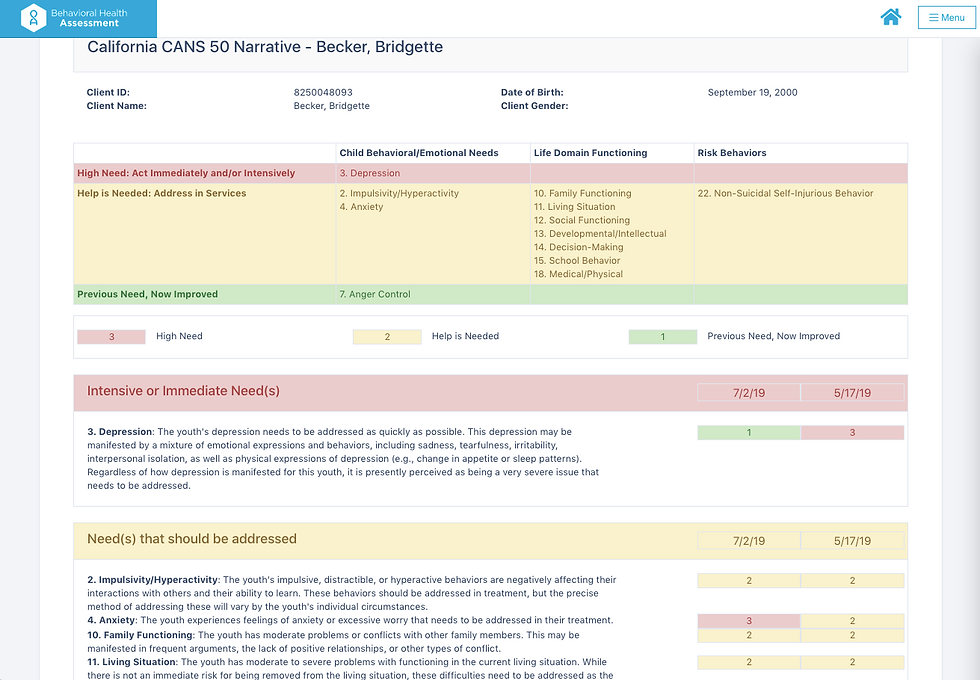Bridging the Gap: How Our Narrative Report Enhances Behavioral Health Analytics
- Steve Grant
- Jun 30, 2025
- 4 min read
Updated: Aug 19, 2025

Clinical Insight Drove Our Approach
The development of our Narrative Report wasn't about technological innovation for its own sake. It was about addressing a real clinical need identified by professionals in the field. Our clinical partners recognized that assessment scores alone weren't enough to guide effective care. They needed a way to see patterns over time, identify priorities, and understand the human story behind the numbers.
Working together, we created a report that:
Organizes multiple CANS assessments to show change over time.
Uses color-coding to quickly identify high-need areas requiring immediate attention.
Provides context by showing how current needs relate to previous assessments.
Highlights both ongoing challenges and areas of improvement.
Incorporates strengths alongside needs for a more complete picture.
These features weren't technological breakthroughs—they were practical solutions to everyday clinical challenges. The report simply applied logical rules to transform assessment data into a more accessible format for clinicians.
Connections to AI's Potential
What's fascinating is how the needs addressed by our Narrative Report align with what artificial intelligence now promises to deliver more broadly. The report uses pre-programmed narratives to organize and highlight information. AI can potentially take this approach much further.
Contextualizing Data
Our report shows how a client's scores have changed over three specific assessment points. AI could analyze more complex patterns, perhaps identifying cyclical changes, correlations between different domains, or subtle improvements that might otherwise go unnoticed.
Prioritizing Information
The "Flag" system in our report uses color-coding to draw attention to high-need areas. AI could develop more sophisticated prioritization, perhaps learning which changes tend to be most clinically significant for particular types of clients or in specific treatment contexts.
Making Connections Across Data Points
Our report shows changes in individual domains separately. AI could identify meaningful connections between changes in different domains—for instance, recognizing when improvements in family functioning typically precede improvements in school performance.
Learning from Outcomes
Perhaps most significantly, while our report presents information in a consistent way based on pre-determined rules, AI systems could learn which patterns actually predict positive outcomes, refining their analysis based on what has worked in similar cases.
The Continued Importance of Clinical Wisdom
The development of our Narrative Report reminds us of something essential about technology in behavioral healthcare: the best solutions emerge from clinical wisdom, not technical possibilities alone. Our clinical partners in Southern California didn't ask for artificial intelligence or machine learning—they asked for a practical tool that would make their work more effective.
This lesson remains vital as we consider the role of AI in behavioral health. The most valuable AI applications won't be those with the most sophisticated algorithms, but those that address real clinical needs and enhance rather than replace professional judgment.
What Makes AI Different
While our Narrative Report serves an important purpose, several key differences distinguish what AI might offer:
Adaptability
Our report follows fixed rules. AI systems can adapt their approach based on new information and outcomes.
Scale and Pattern Recognition
Our report analyzes a limited set of variables for one client. AI can potentially identify patterns across thousands of clients and hundreds of variables simultaneously.
Natural Language
Our report uses structured presentation with some standard text. AI can generate more natural, varied narrative descriptions of client progress.
Integration Across Data Sources
Our report focuses specifically on assessment data. AI could potentially integrate information from multiple sources—assessments, clinical notes, service records, etc.—to create a more comprehensive picture.
A Thoughtful Path Forward
As we consider how AI might enhance behavioral health analytics, the collaborative development of our Narrative Report offers valuable lessons:
Start with clinical needs, not technological capabilities. The best solutions address real problems faced by clinicians and clients.
Preserve human judgment. Technology should organize and present information to support decisions, not make them automatically.
Emphasize clarity and practicality. Detailed analysis is beneficial only when it results in straightforward insights that guide care.
Make the technology accessible. Solutions should be easy to understand and use, without requiring technical expertise.
Looking Forward
The Narrative Report, developed through clinical expertise, represents a practical approach to making assessment data meaningful. AI offers potential to build upon this foundation—not by replacing clinical judgment, but by providing even richer context for that judgment.
We see possibilities for AI to help clinicians understand patterns in their clients' journeys, identify interventions that have worked in similar cases, and recognize early signs of both progress and challenges. These capabilities wouldn't replace the Narrative Report's function but would extend its underlying purpose: helping clinicians see the human stories behind the numbers.
The transition from programmed reports to AI-enhanced analytics isn't about technological sophistication for its own sake. It's about continuing to serve the same fundamental need: making complex data accessible and meaningful for those providing care. By keeping this focus on practical clinical value, we can ensure that new technologies truly enhance rather than complicate the important work of behavioral healthcare.
For more information about Objective Arts' Behavioral Health Analytics Platform and our approach to making behavioral health data meaningful, contact us at *info@objectivearts.com or 847-417-0535




Comments